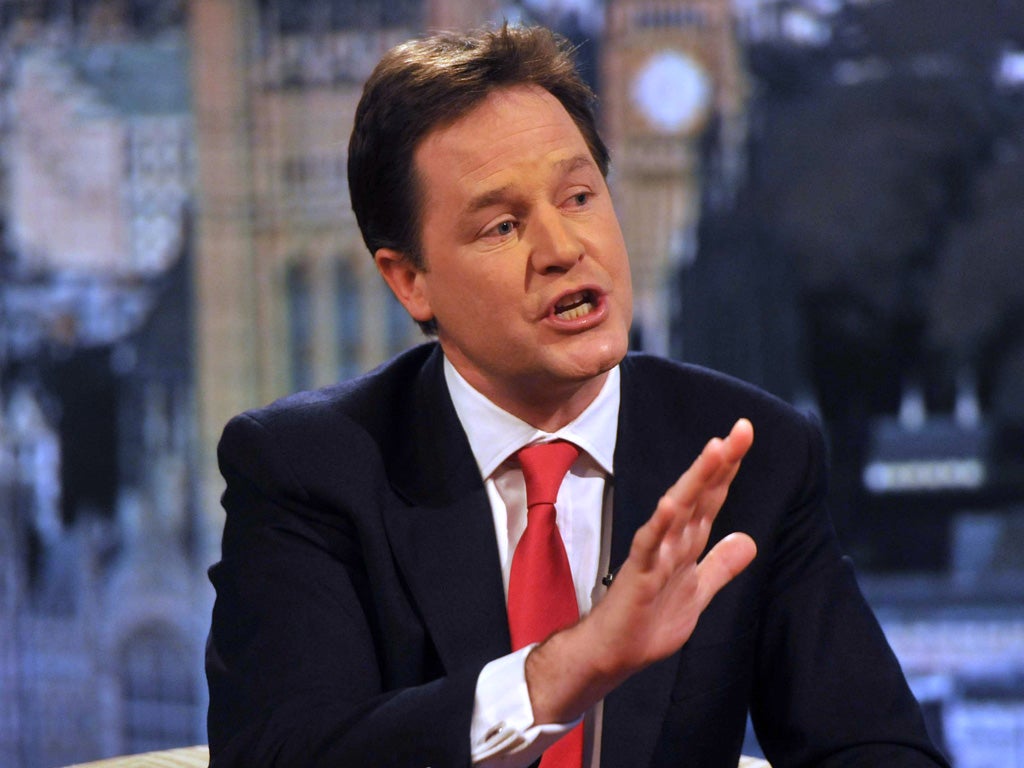Andrew Grice: Cameron facing a perfect Eurosceptic storm
Inside Westminster


After the Liberal Democrats were kept in the dark about Andrew Lansley's health reforms, David Cameron and Nick Clegg agreed a "no surprises" rule to limit the scope for Coalition splits and rows.
The rule has helped but hasn't always been obeyed. It's no coincidence that Mr Clegg's two recent public spats with the Conservatives – on GCSE reform and whether Jeremy Hunt should be investigated by the ministerial standards watchdog – came after he had not been consulted in advance.
These are bumpy days for the Coalition. Next week the Prime Minister and his deputy will try to head off another split, on an issue which deeply divides their parties – Europe. There have been countless "crucial" summits of European Union leaders in recent years but next Thursday's gathering in Brussels lives up to the billing. Unless they agree a credible "road map" to bolster the euro, financial markets may finally move in for the kill. Britain desperately needs some stability in the eurozone. But Mr Cameron may have a problem: one of the key EU measures will be a move towards a "banking union", which could have dangerous implications for Europe's biggest financial centre – the City of London.
Although final decisions on banks will not be made until the autumn, Mr Cameron will be on red alert. Last December, he vetoed an EU-wide fiscal union treaty when he failed to secure safeguards to protect the City. He and George Osborne believe the UK's demands have been totally vindicated by events and are even more relevant now that a banking union is on the table.
However, the December veto caused a major row with the Liberal Democrats. It was another breach of the "no surprises" rule: Mr Clegg was woken at 4am to be told the veto card had already been played. So he and Mr Cameron are working overtime to prevent a repeat next week. Callum Miller, Mr Clegg's principal private secretary for foreign affairs, will be part of the UK delegation, acting as his eyes and ears.
Mr Cameron's clout is limited: not only is Britain outside the euro but, according to Brussels sources, eurozone leaders are increasingly irritated by what they call the PM's "lecturing" from the sidelines.
Mr Clegg has similar worries: his instinct is that more constructive engagement would boost Britain's prospects of getting what it wants. In their private discussions, the Liberal Democrat leader urges Mr Cameron not to threaten to throw Britain's toys out of the EU pram so often.
The PM accepts the point. But Mr Clegg wonders whether Mr Cameron will be able to resist temptation to bang the table or threaten the veto if he doesn't get his own way. "If it's is a choice between upsetting our EU partners or appealing to Conservative MPs and activists, the public and most of the media, then there's only going to be one winner," says one insider.
Indeed, some Clegg aides urge him not to "bang on about Europe", which during the current crisis is hardly going to boost the Liberal Democrats' flagging fortunes.
However it ends, a very different EU will emerge from the crisis. Britain is bound to be affected. As Tory hardliners step up their demands for an in/out referendum, Mr Clegg worries that Britain might be sleepwalking towards the status of Norway – outside the EU, part of the single market but with no influence over the rules.
But the threat from the UK Independence Party, not least at the 2014 European Parliament elections, appears to be pushing Mr Cameron towards a referendum pledge – at least on the UK's membership terms. Mr Clegg sees a slippery slope. Although Mr Cameron wants Britain to remain in the EU, a perfect Eurosceptic storm may be blowing us towards the exit door.
Join our commenting forum
Join thought-provoking conversations, follow other Independent readers and see their replies
Comments
Bookmark popover
Removed from bookmarks